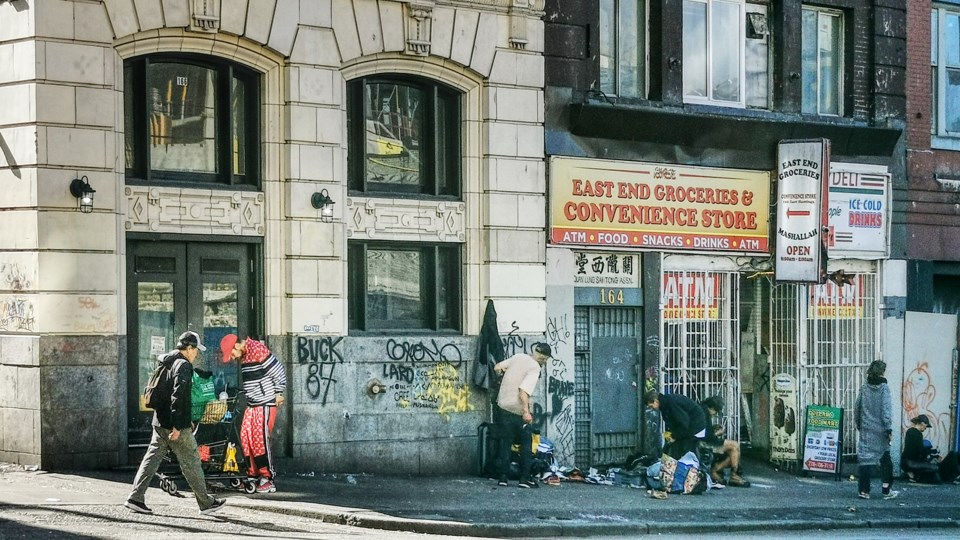The Downtown Eastside (DTES) of Vancouver is often depicted as a neighbourhood full of despair, consumed by drug use, crime and poverty. However, these challenges are symptoms rather than the root cause of the area’s economic decline. This community is home to many local businesses and social enterprises that are struggling to make ends meet. The real issue of that struggle: Chronic and conscious neglect by government, law enforcement and society as a whole.
I’ve worked in community economic development in the DTES for over 10 years. I hold strong relationships with social service leaders, activists, local residents, businesses and property owners. I can’t tell you how many excited new business owners I have witnessed come into the neighbourhood thrilled to start a promising new venture, only to be shut down within one to two years because they couldn’t make it, received little to no help and were left in a perpetual state of uncertainty and instability.
Basic infrastructure upgrades like lighting and sidewalk repairs are non-existent. Police and community safety officers don’t leave their vehicles anymore for fear of their own safety. Gangs and drug dealers are using businesses as their drop locations. Community members who are unhoused are criminalized for existing, and if they are lucky, thrown into poor housing conditions without the necessary wrap-around supports like meals and mental health care. There is a humanitarian crisis happening on our streets, and our provincial government is failing us. Meanwhile, property owners are still forced to charge extremely high rental fees because commercial property taxes are over triple what residential taxes are. Many owners either pass those costs to small business owners or choose to take a loss just to keep a space rented.
This decline is even more glaring when contrasted with the aggressive investment in surrounding areas of Gastown and Chinatown. The City of Vancouver has just completed a summer pedestrian pilot on Water Street, investing millions in placemaking and tourism, and the city and province have put millions of dollars and attention into Chinatown. While those investments are deserved, it further confirms that the neglect of the Hastings corridor, and what people perceive as the DTES, is not a failure of policy but a deliberate decision to turn a blind eye and let the area fester in its challenges.
This abandonment of the neighbourhood exacerbates the economic woes of the area, further kettling the challenges, all while other communities in the region refuse to step up, concentrating the burden on the DTES. Vacant storefronts along Hastings Street not only reduce the aesthetic appeal of the neighborhood but also limit economic opportunities for local entrepreneurs who might be willing to take a chance on starting a business. With fewer businesses operating, fewer jobs are created and residents living in poverty have fewer places to go, leading to a downward spiral of economic disinvestment and decline. The absence of vibrant commercial activity further cements this reputation of the DTES as a neighbourhood in decline, making it even harder to attract the kind of investments needed to spark a turnaround.
Hastings Crossing BIA includes over 850 businesses, social enterprises and properties in the DTES and is also the lowest-funded BIA in Vancouver, as a percentage of overall property tax. We spend over half of our tiny budget on safety and cleaning programs. Our community navigators have responded to over 1,000 incidents of de-escalation, encampments and referrals to other services in the past year. We’ve removed over 2,600 poops from our sidewalks and thousands of graffiti tags. But this is never enough. The apathy among our members to seek an increase to our budget is understandable considering the lack of investment from government partners.
As a BIA, we are stepping up within our ability, but I refuse to sit through another meeting with leaders with little-to-no follow up action. I refuse to witness another anchor business, like Dressew or London Drugs, shutter. I refuse to settle for ignorance or inaction from our leaders. We need urgent action, before the rest of our streets are boarded up and hope is completely sucked out of our community. The livelihood of an entire community is at risk.
Landon Hoyt is a leader in the local economic development and poverty reduction sector in Vancouver and serves as the executive director of the Hastings Crossing BIA, an organization that takes a leadership role in managing change and shaping a more resilient, inclusive and sustainable local economy in the Downtown Eastside.




